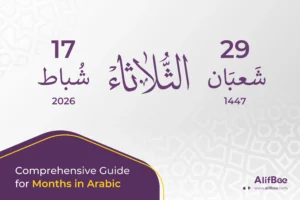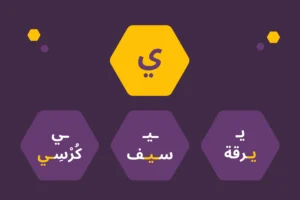Arabic is the official language in over 25 countries worldwide. It is a widely used language, as there are around 300 million native speakers. Knowing Arabic is essential if you want to explore the Arabic culture and live in an Arabic-speaking country, and it is particularly important when you want to learn about Islam and read the Quran.
Nowadays, the number of people who want to learn Arabic is increasing. Since many of them cannot find a teacher, they look for alternative methods to learn Arabic by themselves.
You may ask how I can learn the Arabic language on my own. What is the best way to do so? In this article, we will provide you with some techniques on how to teach yourself Arabic, how to learn the Arabic alphabet on your own, and how to teach yourself Arabic online, along with some easy tips to pronounce Arabic letters.
Can I learn Arabic on my own?
Arabic is known to be among the hardest languages to learn. Learning Arabic can be quite challenging, especially for those who have a Latin-based language as a mother language, for many reasons, such as:
- Arabic script is written from the right to the left.
- Arabic letters have different forms and shapes depending on their position in the word (the beginning, the middle, or the end of the word).
- Some short vowels are not written as full letters, making some words with different meanings and pronunciations seem alike (this can be a problem for beginners, but you will learn how to tell the difference).
- Arabic has some letters and sounds that are not present in English.
- Most Arabic sentences and phrases start with a verb, contrary to Latin languages, in which sentences always start with the subject.
With all that being said, it is normal for new learners to think that having a teacher of Arabic is essential to learning the Arabic language. We are not going to lie. Having teachers to help you learn the language can be helpful, but you can do without one.
What you need to know is that you can learn Arabic by yourself and gain fluency to express yourself. The new research revealed that you can learn any language and master it if you put enough effort into the process. Learning Arabic is no exception here if you have the will to learn. While you intend to teach yourself Arabic, whether beginner or on any level, until you master it, AlifBee will be with you to boost your Arabic learning until you master it.
What is the fastest way to learn Arabic on my own?
When thinking about learning Arabic without a teacher, you will find a lot of methods and ways. But if you want the fastest way to learn Arabic, you will need a way that lets you practice all the skills of Arabic (Listening, speaking, writing, and reading).
To start self-learning, your best choice might be to use a learning app. Learning Arabic with the help of apps has many benefits and advantages. One of the vital benefits is that they let you learn anywhere and anytime. You can take advantage of your free time to improve your language skills no matter where you are.
Another one is the ability to start learning regardless of your level of experience. Whether you are a beginner or have some knowledge of Arabic, you will find a self-learning plan that suits you.
Teaching yourself Arabic using an App allows you to take advantage of listening to audio clips and watching video clips, thus advancing fast in recognizing Arabic letters and how to pronounce them. You can also familiarize yourself with Arabic sentence forms through simple examples provided by native language speakers.
Our app, AlifBee, is an example of a perfect app for learning Arabic by yourself. It has been developed specifically to help non-Arabic speakers learn all that they need to gain fluency in Arabic. You can start from scratch and learn things like writing, reading, and pronouncing the letters of the alphabet or learn about other complicated advanced grammar. Furthermore, AlifBee allows you to practice what you have learned regularly with fun and entertaining quizzes.
How do I start learning Arabic by myself?
Many people find themselves lost and confused when they start learning Arabic. The new alphabet, a large number of new words, and complicated grammar can make Arabic seem even harder.
Before you start, you should have a good plan with defined and clear goals to make things easier. First, you need to set specific short—and long-term goals. For example, say that you want to learn 5 Arabic letters this week and work on achieving your plan.
Setting a good plan with clear goals is essential. It can help you focus on one thing at a time and measure your progress. When you see that you are achieving your goals, you will feel more motivated and know that your hard work has paid off.
AlifBee can make it even easier for you to make a plan and set goals. The lessons are organized in a special order from the beginner to the advanced level. AlifBee can even show the number of new Arabic words you learned, the amount of time you spent learning, and the number of lessons you successfully completed.
How to recognize Arabic letters
First, you might think that Arabic language has a huge number of letters and wonder how many letters there are in Arabic. What you need to know about the Arabic alphabet is that it has 28 letters but each one has several shapes based on its position in the word.
For example, the letter lam (ل) is written at the beginning of the word like this (لـ) while it takes this shape (ـلـ) when it is in the middle of the word. When it comes at the end of the word, it can take this shape (ـل) when it is connected with the previous letter and (ل) when it is not connected with other letters.
For recognizing Arabic letters in all of their shapes, it could be beneficial to learn words that portray an example of each shape. Practicing these words and memorizing them can help you recognize Arabic letters in any shape.
How to pronounce Arabic letters
When it comes to the matter of how to pronounce letters in Arabic, you need to keep a few rules in mind. First, you must know that there are vowels and constant letters. Then, you should know that there are diacritics, which are small marks added above or below the constant letters to guide you in figuring out the right way to pronounce Arabic letters. These diacritics are one of the keys to how to pronounce Arabic letters correctly.
Learning how diacritics affect letters is essential to being able to read Arabic because there are a lot of words that have the same letters but different meanings depending on what diacritics are present. At first, it would be hard to pronounce Arabic letters without diacritics, but after some practice and some pronunciation exercises, you will be able to understand how Arabic letters and words are pronounced without these diacritics being written.
To master the pronunciation of Arabic letters, you need to practice with each letter using different diacritics. Afterward, you will need to learn about other grammar, like the rules regarding the pronunciation of the definite article (ال) with both moon and sun letters.
The process requires you to listen to videos showing Arabic speakers pronouncing the letters with the letter and diacritics written on the screen and try to repeat these letters. By listening to Arabic letters pronounced by a native speaker along with proper practice, you will find Arabic letter pronunciation easier.
Examples – What are some Arabic words?
The Arabic language has plenty of words. In fact, the Arabic language may be the richest language in words, with over one million words (some say it has over 12 million words). It may even surprise you that there are several words that you use daily derived from Arabic words.
For example:
- The word Cotton is derived from the word (قطن), with almost the same pronunciation in both languages.
- The word Sugar comes from the word (سكر) in Arabic. It is pronounced Sukkar.
- The word Giraffe also has an Arabic origin, which is the word (زرافة) Zarafa.
- You must have studied Algebra in school, and it originated from the word (الجبر) pronounced Aljabr.
- The word (laa), in Arabic (لا), means no
- The word (shukran), in Arabic (شكراً), means thank you.
- The word (Asef), in Arabic (آسف), means I am sorry.
- The word (ṯhāniyah), in Arabic (ثانية), means one second.
- The word (Jamil), in Arabic (جميل), means a handsome guy.
- The word (Sahl), in Arabic (سهل), can mean both easy and plain (flat land).
How to pronounce “hello” in arabic
Hello is a common word that is used to greet others in English, which is usually translated in Arabic to the word (مرحبا). As a beginner self-studying Arabic, you might wonder how Arab speakers pronounce “hello”. The Arabic word of hello is pronounced (Marhaba). However, there are some Arabic places where other words are used for greeting instead. Here are some examples:
- Assalamo Alaykom (السلام عليكم): This is the Islamic way of greeting, and it means Peace be upon you.
- Salam: This word is translated to “peace,” and a lot of people use it to greet.
Are online platforms useful for me in learning Arabic by myself?
Nowadays, there are many online learning platforms that can help you learn languages. However, some students may wonder if these apps are useful for learning a hard and complex language like Arabic.
Good Arabic self-learning apps include an online Arabic dictionary and vocabulary practice lessons to enrich your Arabic vocabulary and experience.
Many of these apps can be good for learning the basics of Arabic. But if you want to become fluent in Arabic, you may need to choose the app wisely and maybe consider using the AlifBee app.
AlifBee is not like other language learning platforms. It is a special platform designed to help non-Arabic speakers become fluent in Arabic with many lessons progressing from beginner to advanced level.
Final Word
Learning Arabic is definitely not an easy task. But with the right learning app and the will to learn, you can master Arabic and be able to speak it fluently. AlifBee can be your companion in learning Arabic by yourself. Using AlifBee, you can learn Arabic gradually and assess your learning process until you can speak Arabic fluently. Sign up now for free and try our learning plans.









